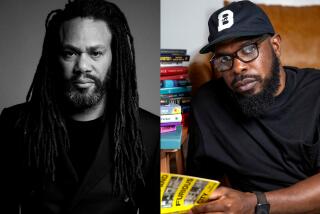Whiting Writers’ Program Confers Its First Awards
NEW YORK — In a Halloween ceremony in the staid elegance of the stately old Pierpont Morgan Library here, 10 winners were announced in what is believed to be this country’s largest privately supported program of individual support exclusively for writers.
The awards, of $25,000 each, marked the first year of the Whiting Foundation Writers’ Program. The recipients, chosen according to the foundation’s mandate to “identify and support writers of exceptional promise,” were selected by a small, anonymous committee of writers, literary scholars and editors.
“We believe that this program is especially timely and responsive to the major problems created for authors by the increasing economic pressures on the publishing world,” said foundation trustee Robert M. Pennoyer.
A Special Emphasis
“The Whiting Writers’ Award will place special emphasis on exceptionally promising emerging talent,” said Dr. Gerald Freund, director of the program. This year’s winners include Raymond Abbott, 43, of Louisville, Ky., author of the novel “Death Dances” (Apple-wood Books); New York writer Douglas Crase, 41, author of “The Revisionist,” a book of poems published by Little, Brown in 1981; and Stuart Dybek, 43, of Kalamazoo, Mich. The author of a collection of stories called “Childhood and Other Neighborhoods” (Viking), Dybek has written poetry and fiction for such magazines as the New Yorker, the Atlantic and the Paris Review.
Also selected were Jorie Graham, 34, of Iowa City, author of two books of poetry published by Princeton University Press; Linda Gregg, 43, of Northampton, Mass, whose newest book, “Alma,” will be published next year by Random House; and 75-year-old Wright Morris of Mill Valley, Calif. Morris’ first novel, “My Uncle Dudley,” was published in 1942, and since then, his body of writing has grown to include 19 novels, five photo-text books, four collections of essays, one collection of short stories, one anthology and three memoirs, the latest of which, “A Cloak of Light,” was published this year by Harper & Row. Morris is a professor emeritus at San Francisco State University.
Born in 1949, winner Howard Norman of Cambridge, Mass., published a translation called “Where the Chill Came From: Cree Windigo Tales and Journeys” (North Point Press). Next year, his novel “The Northern Lights” will be published by Summit Books. A resident of Brookline, Mass., 39-year-old James Robison, has written “Rumor and Other Stories” (Summit Books), and the forthcoming “The Illustrator,” to be published by Summit in 1986.
Poetry Collection
James Schuyler, 62, of New York, is the Pulitzer Prize-winning author of “The Morning of the Poem,” published in 1981 by Farrar, Straus and Giroux, and 10 other works of poetry and fiction. Random House has recently published his newest collection of poetry, “A Few Days.”
Finally, winner Austin Wright, 63, a professor of English at the University of Cincinnati, has written three novels and, in 1982, a volume of literary scholarship, “The Formal Principle in the Novel” (Cornell University Press).
Explaining the program’s selection process, Freund said the grants were open to writers of fiction, poetry or nonfiction, as well as to essayists, literary scholars, playwrights and critics. “Candidates need not have previously published a book,” Freund said, adding that to qualify, writers “need not be ‘young,’ since talent may emerge at any age.”
The Whiting Foundation was established in 1963 by Mrs. Giles Whiting, a leading cultural figure in the New York area. The foundation served first as a conduit for her personal charitable gifts, and, following her death, in 1971, as a vehicle to receive and administer capital funds from her estate.
Whiting’s unrestricted bequest of $10 million established the Whiting Fellowships in the Humanities in 1972. Since then, the foundation has annually awarded grants to assist deserving doctoral candidates in the humanities in the final year of their dissertations to Bryn Mawr, Columbia, Harvard, Princeton, Stanford, Yale, and, since 1976, the University of Chicago.
More to Read
Sign up for our Book Club newsletter
Get the latest news, events and more from the Los Angeles Times Book Club, and help us get L.A. reading and talking.
You may occasionally receive promotional content from the Los Angeles Times.






